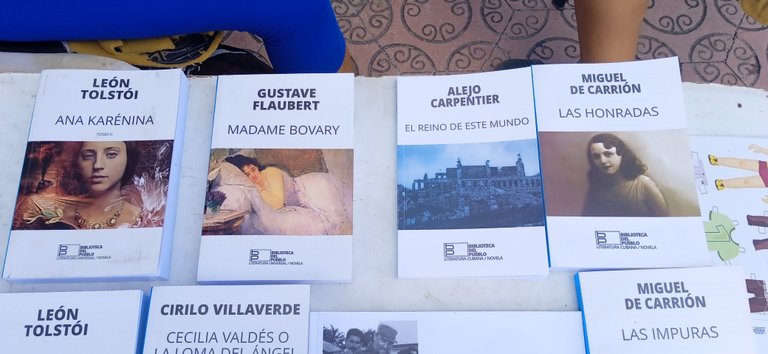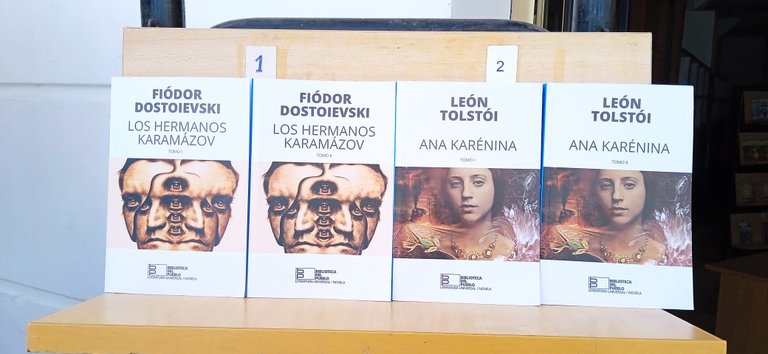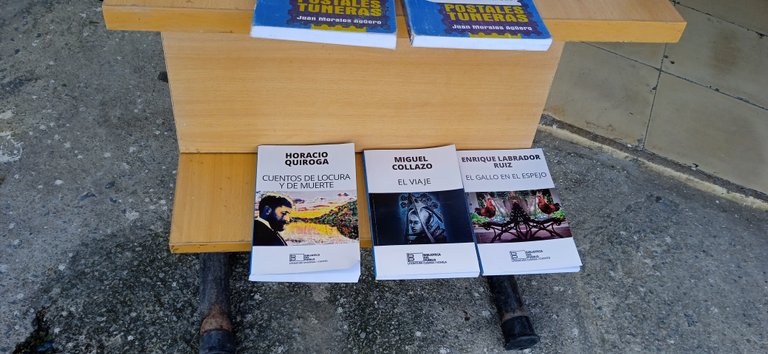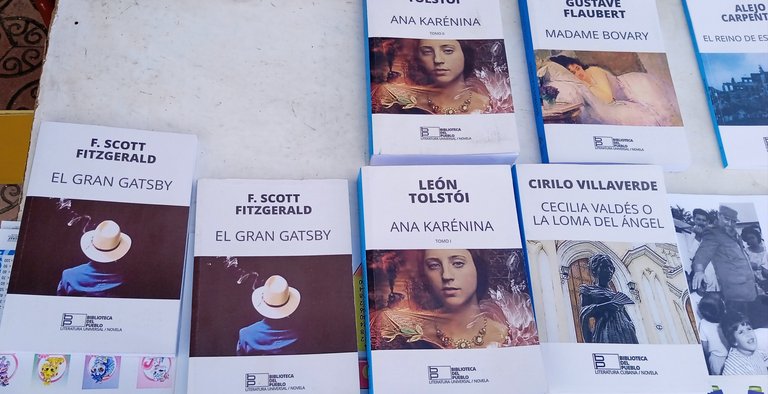Please, read poetry... fiction, whatever, but read / Por favor, Lea poesía... narrativa, lo que sea, pero lea (eng-esp)
Hello, friends of Holos & Lotus
Next month I'll be returning to the classroom, but this time in a dual role: as a history teacher and as a student in the Spanish Literature teaching program.
This is something that makes me very happy, since I have the opportunity to teach and I'm committed to helping my students acquire the thirst for knowledge I'd like them to have and, above all, to develop the habit of reading.

I'm a writer. What I enjoy most about writing and reading is science fiction and fantasy literature, so whenever I have the opportunity, I try to encourage the habit of reading.
And not only for that reason, friends, but because there is an ever-increasing need for this habit, and it's evident in the limited vocabulary, poor spelling, and poor general knowledge of today's children and young people.
All of this can be perfectly corrected through reading. By reading every day, we not only entertain ourselves, but we also educate ourselves.
Reading, literature saves. Sometimes, literally.
Here's a list of some of the most important reasons why reading, especially the classics, is essential for our personal growth:
Development of Critical Thinking

In my workshops and classrooms, I've encountered people who don't know how to interpret a text or analyze a work of literature, theater, or film.
If the plot gets a little complicated, they quickly lose interest and drop it. They don't like it, and how can they like it if they don't understand it?
I always recommend starting with the classics.
The classics present profound ideas about human nature, ethics, and society that have stood the test of time. Works like Dostoevsky's Crime and Punishment or Orwell's 1984 invite us to reflect on universal themes such as morality, power, and freedom. To give just one example.
By reading them, we exercise our ability to analyze, question, and form our own criteria, which helps us make wiser decisions in life.
Cultural and Linguistic Enrichment

The classics are the foundation of literature and contain rich language, complex narrative structures, and historical references. For example, reading Cervantes or Shakespeare. These are essential pillars for our language.
Yes, even Shakespeare, for Spanish speakers, and Cervantes for English speakers. These readings improve our understanding of the language and its evolution.
Reading them not only expands our vocabulary and communication skills but also connects us with humanity's cultural heritage, allowing us to better understand today's world.
Emotional and Humanizing Connection

The characters and situations in classics (such as Jane Austen's Pride and Prejudice or Victor Hugo's Les Misérables, to name just two examples) reflect timeless human emotions and conflicts.
Through reading, this connection fosters empathy, as we put ourselves in the shoes of others, even from different eras and cultures, helping us better understand human motivations and suffering.
Strengthening resilience and existential perspective

This is one of the most dense benefits, to put it mildly, but no less true for that.
The classics address themes like suffering, death, love, and the struggle to find meaning in life. Works like The Magic Mountain by Thomas Mann or The Myth of Sisyphus by Albert Camus explore the human condition in its rawness and beauty.
They are two difficult works to read, I know (more Mann than Camus), but they are essential.
By confronting these narratives, we learn to process our own adversities more deeply. The characters and philosophies present in these books act as mirrors or guides, offering comfort and teaching us that our struggles are part of a universal experience.
Influence on Creativity and Originality

This is one of the most important of all, in my opinion. Magic and fantasy are sorely lacking in this world, which increasingly resembles the gray universe Ende described in Momo.
The classics have inspired generations of artists, writers, and thinkers. Their structure, symbolism, and themes (such as the archetypes in Homer's The Odyssey or the moral dilemmas in Goethe's Faust) are inexhaustible sources of ideas.
I could put an endless number of works and authors, but I'll limit myself to mentioning The Lord of the Rings by J. R. R. Tolkien, The Neverending Story by Michael Ende, Alice in Wonderland by Lewis Carroll, and even Dune by Frank Herbert. These are some of the most inspiring and imaginative works I've ever read.
Reading them not only nourishes the imagination, but also teaches us how to construct complex narratives and innovate from what's already established. They show us that there are no limits to the imagination and the wonder and necessity of originality.
Reading classics is not just an intellectual exercise, but a tool for growing as individuals, understanding our history, and developing a sharper and more sensitive mind.
They are not classics for nothing. They have transcended time and remain as fresh as when they were written.
These works can be gateways to a love of books, to cultural, linguistic, spiritual, and even professional growth. Why not?
One way or another, our society needs to read more and better. These are some books I recommend. My friend @marabuzal has reviewed several books that are a must-have. You can read his reviews and look for those books, or you can ask me for a recommendation for introductory reading (or not), and I'll give them to you.
P.S.: I could have included other books here, and it would have worked just as well. I included those titles just as a sample, not because they were the only ones or the most representative.
Versión en español
Hola, amigos de Holos & Lotus
El mes próximo retornaré a las aulas, pero esta vez en doble función: como profesor de historia y como alumno en la carrera de profesor de Español Literatura.
Esto es algo que me hace muy feliz, ya que tengo la oportunidad de enseñar y estoy empeñado en lograr que mis estudiantes adquieran la sed de conocimientos que quisiera que tuvieran y que, sobre todas las cosas, adquieran el hábito de lectura.

Soy escritor. Lo que más disfruto escribir y leer, es la literatura de ciencia ficción y fantasía, por tanto, siempre que tengo la oportunidad, trato de fomentar el hábito de la lectura.
Y no solo por eso, amigos, sino porque, cada vez hay mayor necesidad de este hábito y se nota en la pobreza de vocabulario, la horrible ortografía y la poca cultura general de los niños y jóvenes de hoy en día.
Todo esto es perfectamente corregible con la lectura. Con leer cada día, no solamente nos entretenemos, sino que nos instruimos.
La lectura, la literatura salva. A veces, literalmente.
Aquí tienes una lista de algunas de las razones más importantes por las que la lectura, especialmente de los clásicos, es fundamental para nuestro crecimiento personal:
Desarrollo del Pensamiento Crítico

En mis talleres y aulas me he encontrado con personas que no saben interpretar un texto, analizar una obra literaria, de teatro o de cine.
Si la trama se complejiza un poco, enseguida pierden el interés y la dejan. No les gusta, ¿y cómo les gustará si no la entienden?
Yo siempre recomiendo ir y comenzar por los clásicos.
Los clásicos presentan ideas profundas sobre la naturaleza humana, la ética y la sociedad, que han resistido el paso del tiempo. Obras como Crimen y castigo de Dostoievski o 1984 de Orwell invitan a reflexionar sobre temas universales como la moral, el poder y la libertad. Por solo poner un ejemplo.
Al leerlos, ejercitamos la capacidad de analizar, cuestionar y formar criterios propios, lo que nos ayuda a tomar decisiones más sabias en la vida.
Enriquecimiento Cultural y Lingüístico

Los clásicos son la base de la literatura y contienen un lenguaje rico, estructuras narrativas complejas y referencias históricas. Por ejemplo, leer a Cervantes o a Shakespeare. Estos son pilares imprescindibles para nuestra lengua.
Sí, incluso Shakespeare, para los hispanohablantes y Cervantes para los anglófonos. Estas lecturas mejoran la comprensión del idioma y su evolución.
Al leerlos, no solo expande nuestro vocabulario y habilidades comunicativas, sino que también nos conecta con el patrimonio cultural de la humanidad, permitiéndonos entender mejor el mundo actual.
Conexión Emocional y Humanizadora

Los personajes y situaciones de los clásicos (como los de Orgullo y prejuicio de Jane Austen o Los Miserables de Victor Hugo, por solo poner dos ejemplos) reflejan emociones y conflictos humanos atemporales.
A través de la lectura, esta conexión fomenta la empatía, al ponernos en el lugar de otros, incluso de épocas y culturas distintas, ayudándonos a comprender mejor las motivaciones y sufrimientos humanos.
Fortalecimiento de la resiliencia y la perspectiva existencial

Este es uno de los beneficios más densos, para decirle de algún modo, pero no por eso menos cierto.
Los clásicos abordan temas como el sufrimiento, la muerte, el amor y la lucha por encontrar sentido en la vida. Hay obras como La Montaña Mágica de Thomas Mann o El mito de Sísifo de Albert Camus exploran la condición humana en su crudeza y belleza.
Son dos obras difíciles de leer, lo sé (más a Mann que a Camus), pero son imprescindibles.
Al enfrentarnos a estas narrativas, aprendemos a procesar nuestras propias adversidades con mayor profundidad. Los personajes y filosofías presentes en estos libros actúan como espejos o guías, ofreciendo consuelo y enseñándonos que nuestras luchas son parte de una experiencia universal.
Influencia en la creatividad y la originalidad

Esta es una de las más importantes de todas, en mi opinión. Hace tanta falta la magia y la fantasía en este mundo, cada vez más parecido al universo gris que describió Ende en Momo.
Los clásicos han inspirado generaciones de artistas, escritores y pensadores. Su estructura, simbolismo y temas (como los arquetipos en La Odisea de Homero o los dilemas morales en Fausto de Goethe) son fuentes inagotables de ideas.
Aquí podría poner un sinfín de otras obras, pero me limitaré a mencionar El señor de los anillos, de J. R. R Tolkien, La historia interminable, de Michael Ende, Alicia en el país de las maravillas de Lewis Carrol, e incluso Dune, de Frank Herbert, son de las obras más inspiradoras e imaginativas que he leído.
Leerlos no solo nutre la imaginación, sino que también enseña a construir narrativas complejas y a innovar desde lo ya establecido. Nos muestran que no hay límites para la imaginación y lo maravilloso y necesario de la originalidad.
Leer clásicos no es solo un ejercicio intelectual, sino una herramienta para crecer como personas, entender nuestra historia y desarrollar una mente más aguda y sensible.
No por gusto son clásicos. Han trascendido en el tiempo y se mantienen tan frescos como cuando fueron escritas.
Estas obras son aquellas que pueden ser las puertas al amor a los libros, al crecimiento cultural, lingüístico, espiritual y hasta profesional, ¿por qué no?
De una manera u otra, nuestra sociedad necesita leer más y mejor. Estas son algunas obras que recomiendo. Mi amigo @marabuzal ha realizado varias reseñas de libros que no pueden faltar. Puedes leer sus reseñas y buscar esos libros o me puedes pedir una recomendación de lecturas iniciáticas (o no) y te las daré.
PD: Aquí pude poner otros libros y hubiera funcionado igual de bien. Puse esos títulos, solo como muestra, no porque fueran ni los únicos ni los más representativos.
Ahí hay libros a los que le he caído atrás aquí en Camagüey y no he podido encontrar.
La lectura siempre nos engrandece🙏🌻
Cuáles quieres?
Te deseo toda la suerte del mundo en tu nuevo empleo. Esos estudiantes serán muy afortunados de tenerte frente al aula.
Cualquiera quisiera tener a un profesor loco como yo jajajajaja
You are preaching to the choir! :) I love reading , and I love writing too. There's so much to learn in the story of others, and we have certainly - and biologically evolved around a campfire where story, reading and discussion on story is a foundational method for gaining knowledge and wisdom.
I don't see readers out in "public" often, but I have gone to become a part of my local area's writing group, and hearing their stories in our short little 15-minute prompt based exercises, for a moment, lets me hear the complex noise that goes on in their minds and to "Test" my own writing too.
And maybe, somewhere along the way, we will draw a connection between the disconnected, and all learn something new.
But we can't be satisfied with our reading group. As a teacher, I care about my students writing, about reading. Not only so they can increase their literacy, but so they can learn to analyze and interpret better. That would help them learn better. It's a win-win.
I gain readers, and they learn.
Muchos éxitos, sin duda, leer nos trae tantos beneficios, gracias por las recomendaciones.
Leer, más que un placer, se convierte en una necesidad y hasta en hábito. Tu post es una demostración de cómo nos beneficia
muy cierto, es importante leer, nutre no solo en conocimiento también el alma, la creatividad, buen post
Leer "lo que sea, pero lea", más no así tanto, ya que me recordó un chiste corto:
😅
Jaja, y bueno, ya aparte de ese chiste malo. Dentro de las deficiencias que produce la no lectura también se encuentra la mala redacción, si, cuando alguien que no tiene el hábito de la lectura le toca hacer una redacción, ufff, sufre, y los resultados por lo general son penosos. Buenísimo todo el texto y las recomendaciones de lectura que haces. Gracias por compartir. Éxitossssss!!!